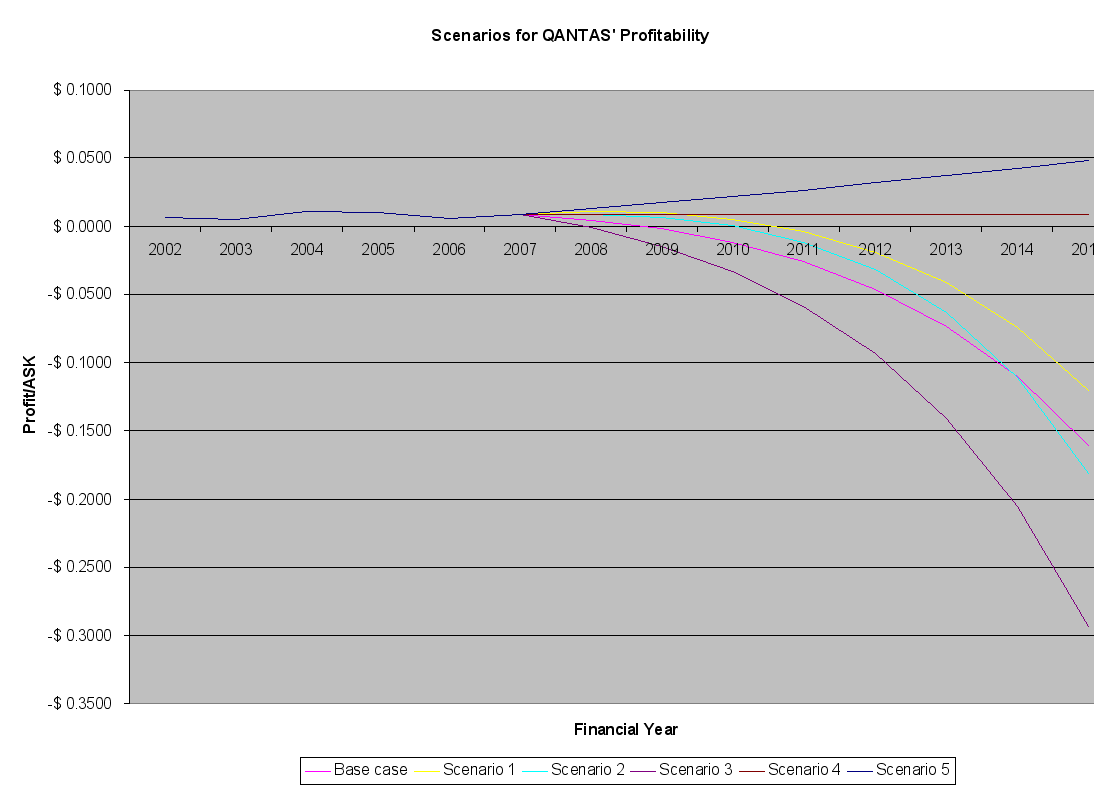The Future Of Qantas And Virgin Blue
Posted by Big Gav in air transport, oil price, qantas, virgin blue
Cameron Leckie of ASPO Australia has a post at TOD ANZ looking at the financial future for Australian air carriers Qantas and Virgin Blue under a variety of scenarios - A Tale of Profit and Loss - The Future of Air Travel – Part 2.
This post will examine in some detail Australia’s two largest airlines with the aim to establish how long they will remain profitable in an era of high oil prices. The approach taken is to develop growth figures across a number of categories based on the airlines historical data. The data has been obtained from the financial reports of both airlines. The time frame that has been used is from FY 2003/04 through to 2006/07. The historical growth rates will then be projected forward until 2018. After developing the base case, a number of differing scenarios will be developed that will provide an indication of how long we can expect the airlines to remain profitable. ...
The scenarios that will be used are described below:
* Scenario one. Revenue, fuel costs and capacity growth continues to grow at historical rates whilst on-fuel costs reduce.
* Scenario two. Revenue and fuel costs continues to grow at historical rates (calculated according to provided capacity), whilst non-fuel costs and capacity reduce.
* Scenario three. Fuel costs continues to grow at historical rates (calculated according to provided capacity) whilst revenue, non-fuel costs and capacity reduce.
* Scenario four. Fuel costs remain constant relative to capacity whilst revenue, non-fuel costs and capacity reduce.
* Scenario five. Fuel costs remain constant relative to capacity whilst revenue, non-fuel costs and capacity increase at historical rates.
2% per annum has been used as the figure declining costs, capacity growth and revenue. Obviously, higher or lower figures will result in changes to the predictions developed.
Some of these scenario’s assume that the airlines can increase revenue and reduce non fuel operating costs in an era of high oil prices. Oil prices have been negatively impacting airlines for some years now. For example in the QANTAS annual report of 2005 it stated that ‘Qantas’ greatest challenge remains the cost of fuel, which we believe will stay at the current high levels. As a result airlines for a number of years have been reducing costs. The easy cost saving options have already implemented, meaning that to further reduce costs will be increasingly difficult. The airlines will no doubt continue to raise fuel surcharges in an effort to increase revenue. Unfortunately for the airlines, each fare increase will result in fewer passengers, meaning that their Revenue Seat Factor or Load factor will fall, leading to further capacity reduction. ...
This analysis provides some very worrying findings. Both of Australia’s major airlines could become unprofitable within a couple of years if current trends continue and unviable at some point shortly after that. There is some hope that a reduction in capacity and non-fuel operating costs with a steadying of fuel costs may allow the airlines to remain profitable, but with peak exports likely past and peak oil in the not to distant future, this is a slim hope.
From a risk management perspective, the collapse of airlines would have a major negative impact on the Australia economy. Based on this analysis, it is almost certain that the airlines will collapse, it is only a matter of time unless fuel prices are reduced, and quickly, to a more manageable level over the long term. Declining exports and discoveries whilst demand continues to increase, means that it is unlikely that this will occur. The net result is that Australia faces an extreme level of risk.
With so much at stake, it would be reasonable to expect that our nation’s leaders would be doing everything in their power to prepare the nation for a new age of higher oil prices. Over recent weeks, there has been much discussion by the major political parties on issues such as FuelWatch6 and reducing either the GST or excise on petrol, but very little on practical methods of reducing our dependence on oil. I will leave it to you to decide how well we are being served by our leaders on an issue of such vital importance to the future of our nation.







